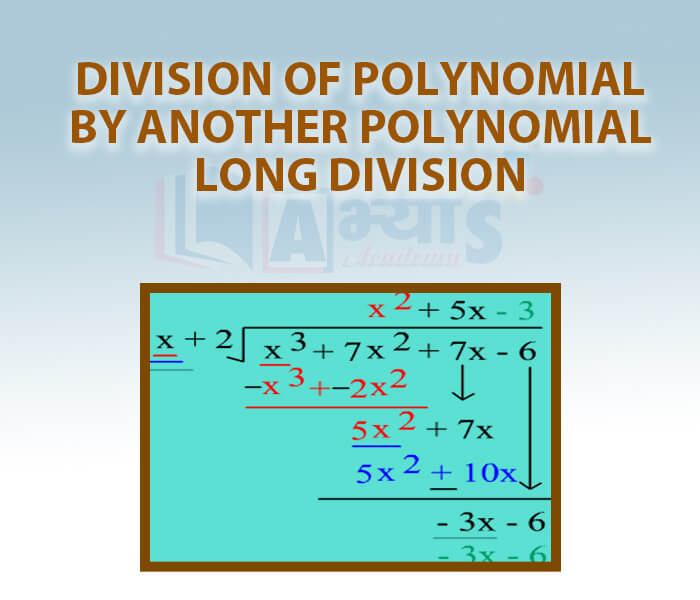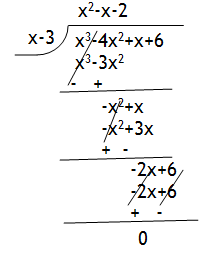Division of Polynomial by another Polynomial Long Division









Division of Polynomial by another Polynomial Long Division
Division of a polynomial by a binomial by using long division
For dividing a polynomial by a binomial, we may follow the following steps:
Step I Arrange the terms of the dividend and divisor in descending order of their degrees.
Step II Divide the first term of the dividend by the first term of the divisor to obtain the first term of the
quotient.
Step III Multiply the divisor by the first term of the quotient and subtract the result from the dividend to
obtain the remainder.
Step IV Consider the remainder (if any) as dividend and repeat step II to obtain the second term of
quotient.
Step V Repeat the above process till we obtain a remainder which is either zero or a polynomial of
degree less than that of the divisor.
Example 1 Divide
Solution We go through the following steps to perform the division:
Step I We write the terms of the dividend as well as of divisor in descending order of their
degrees. Thus, we write
Step II We divide the first term of the dividend by the first term
of the divisor and obtain
as the first term of the quotient.
Step III We multiply the divisor by the first term
we get
of the quotient
and subtract the result from the dividend
We obtain as the remainder.
Step IV We take as the new dividend and repeat step II to obtain the second
term of the quotient.
Step V We multiply the divisor by the second term
of the quotient and subtract the
result from the new dividend. We obtain
as the remainder.
Step VI Now we treat as the new dividend and divide its first term
by the first
term of the divisor to obtain
as the third term of the quotient.
Step VII We multiply the divisor and the third term
of the quotiemt and subtract the
result from the new dividend. We obtain
as the remainder.
Thus, we can say that
or,

If | |||
| Right Option : B | |||
| View Explanation | |||
A polynomial of degree five is divided by a quadratic polynomial. If it leaves a remainder, then the degree of remainder is _________________ | |||
| Right Option : B | |||
| View Explanation | |||
Find the remainder when | |||
| Right Option : A | |||
| View Explanation | |||
Students / Parents Reviews [20]
My experience with Abhyas academy is very nice or it can be said wonderful. I have been studying here from seven class. I have been completing my journey of three years. I am tinking that I should join Abhyas Academy in tenth class as I am seeing much improvement in Maths and English

Hridey Preet
9thWhen I have not joined Abhyas Academy, my skills of solving maths problems were not clear. But, after joining it, my skills have been developed and my concepts of science and SST are very well. I also came to know about other subjects such as vedic maths and reasoning.

Sharandeep Singh
7thMy experience was very good with Abhyas academy. I am studying here from 6th class and I am satisfied by its results in my life. I improved a lot here ahead of school syllabus.

Ayan Ghosh
8thAbhyas is good institution and a innovative institute also. It is a good platform of beginners.Due to Abhyas,he has got knoweledge about reasoning and confidence.My son has improved his vocabulary because of Abhyas.Teacher have very friendly atmosphere also.

Manish Kumar
10thThird consective year,my ward is in Abhyas with nice experience of admin and transport support.Educational standard of the institute recumbent at satisfactory level. One thing would live to bring in notice that last year study books was distributed after half of the session was over,though study ...

Ayan Ghosh
8thAbout Abhyas metholodology the teachers are very nice and hardworking toward students.The Centre Head Mrs Anu Sethi is also a brilliant teacher.Abhyas has taught me how to overcome problems and has always taken my doubts and suppoeted me.

Shreya Shrivastava
8thMy experience with Abhyas academy is very good. I did not think that my every subject coming here will be so strong. The main thing is that the online tests had made me learn here more things.

Hiya Gupta
8thIt was good as the experience because as we had come here we had been improved in a such envirnment created here.Extra is taught which is beneficial for future.

Eshan Arora
8thUsually we see institutes offering objective based learning which usually causes a lag behind in subjective examinations which is the pattern followed by schools. I think it is really a work of planning to make us students grab the advantages of modes of examination, Objective Subjective and Onli...

Anika Saxena
8thIn terms of methodology I want to say that institute provides expert guidence and results oriented monitering supplements by requsite study material along with regular tests which help the students to improve their education skills.The techniques of providing education helps the students to asses...

Aman Kumar Shrivastava
10thAbhyas institute is one of the best coaching institute in the vicinity of Ambala Cantt area. The teachers of the institute are well experienced and very helpful in solving the problems of the students.The good thing of the institute is that it is providing extra classes for the students who are w...

Aman Kumar Shrivastava
10thOne of the best institutes to develope a child interest in studies.Provides SST and English knowledge also unlike other institutes. Teachers are co operative and friendly online tests andPPT develope practical knowledge also.

Aman Kumar Shrivastava
10thA marvelous experience with Abhyas. I am glad to share that my ward has achieved more than enough at the Ambala ABHYAS centre. Years have passed on and more and more he has gained. May the centre flourish and develop day by day by the grace of God.

Archit Segal
7thAbhyas academy is great place to learn. I have learnt a lot here they have finished my fear of not answering.It has created a habit of self studying in me.The teachers here are very supportive and helpful. Earlier my maths and science was good but now it has been much better than before.

Barkha Arora
10thAbhyas institute is one of the best coaching institute in the vicinity of Ambala cantt.The institute provides good and quality education to the students.The teachers are well experienced and are very helpful in solving the problems. The major advantages of the institute is extra classes for weak...

Shreya Shrivastava
8thMy experience with Abhyas Academy has been very good. When I was not in Abhyas whenever teacher ask questions I could not speak it confidently but when I came in Abhyas, my speaking skills developed and now I am the first one to give the answer of teachers question.

Upmanyu Sharma
7thBeing a parent, I saw my daughter improvement in her studies by seeing a good result in all day to day compititive exam TMO, NSO, IEO etc and as well as studies. I have got a fruitful result from my daughter.

Prisha Gupta
8thMy experience with Abhyas is very good. I have learnt many things here like vedic maths and reasoning also. Teachers here first take our doubts and then there are assignments to verify our weak points.

Shivam Rana
7thAbhyas is a complete education Institute. Here extreme care is taken by teacher with the help of regular exam. Extra classes also conducted by the institute, if the student is weak.

Om Umang
10thWe started with lot of hope that Abhyas will help in better understnding of complex topics of highers classes. we are not disappointed with the progress our child has made after attending Abhyas. Though need to mention that we expected a lot more. On a scale of 1-10, we would give may be 7.
